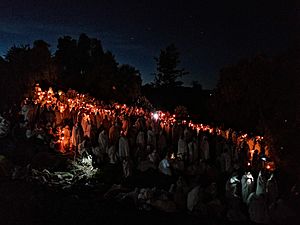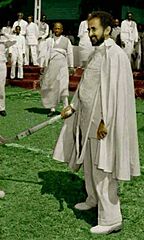Ethiopian Christmas facts for kids
Quick facts for kids Ethiopian Christmas |
|
|---|---|

Vigil lightening at Lalibela during Christmas
|
|
| Observed by |
|
| Type | Eastern Christian |
| Significance | Birth of Jesus |
| Celebrations |
|
| Date | 7 January |
| Frequency | Annual |
| Related to | Christmas |
Ethiopian Christmas (Amharic: ገና; Oromo: Ayaana; Tigrinya: ልደት) is a holiday celebrated by the Ethiopian Orthodox and Eritrean Orthodox churches, as well as Protestant and Catholic denominations in Ethiopia, on 7 January (Tahsas 29 in the Ethiopian calendar).
One of the distinct features of Ethiopian Christmas is a traditional game similar to hockey. The game is believed to have evolved from the shepherds tending their flocks on the night Jesus was born.
Contents
Overview
Ethiopian Christmas is celebrated on 7 January (Tahsas 29 in the Ethiopian calendar) as the day of Jesus' birth, alongside the Russian, Greek, Eritrean and Serbian Orthodox Churches. It is also celebrated by Protestant and Catholic denominations in the country.
Ethiopian Orthodox Christians are expected to fast for 43 days, a period known as Tsome Nebiyat or the Fast of the Prophets. Fasting also includes abstaining from all animal products and alcohol. Starting on 25 November, the fast believed to be "cleansing the body of sin" as they await the birth of Jesus.
Festivities
On Christmas Day, a thin white cotton garment called netela is worn. On the Christmas Eve, Ethiopian Christians attend an overnight church service, usually starting around 6:00pm and finishing at 3:00am. People line up surrounding a church and begin a long, looping procession around the circumference of the church. The festivities are a communal experience and a commitment of faith. The holiday attracts pilgrimages to the Lalibela Churches.
Gena

Gena (ገና) or Qarsa (ቃርሳ) is a traditional field hockey game popular in the Ethiopian highlands. It is a game played in the space between villages but with no defined boundaries.
It is a game played in the space between villages, a field of about 100 yards, but with no defined boundaries. It is played among two teams who attempt to throw a wooden ball in the air and hit it with sticks, the goal being to prevent the opposing team from bring the ball to their village, or score it in your goal.
The game is closely associated with Gena, the January 7 celebration of Christmas, from which it gets its name along with another, rugby-like, sport. Historically, Imperial Ethiopian soldiers acquired proficiency in weapon use from a young age by being trained from childhood with games such as Akandura (Darts) and Gena, which imitated combat.
See also
- Meskel
- Public holidays in Ethiopia

